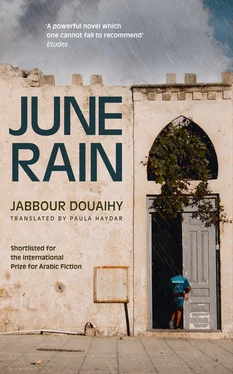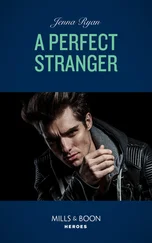‘Not known to have stable employment though did well for himself. Did a lot of buying and selling, was said that one day before the incident he got a good deal on some guns and sold a bunch of them to his cousins and some to the family of the enemy, too, some people wanted to believe he was shot by one of those guns he sold to his enemies, married with five children.’
And then suddenly, just before the end: ‘Gambler, opened some clubs here and there, partnered with others here and there, played cards and fixed the deck, 42 years old, married, not blessed with children.’
Muntaha reads that one and stops.
‘That’s Yusef, isn’t it?’ Kamileh says.
‘Maybe.’ Muntaha regrets having read what Eliyya wrote about his father. Something caught Kamileh’s attention. She grabs Muntaha’s hand. ‘Read that to me again.’
Muntaha obliges. ‘Gambler, opened some clubs here and there, partnered with others here and there, played cards and fixed the deck, 42 years old, married.’
‘Is that it?’
‘Yes, that’s it.’
‘You’re a liar, Muntaha,’ Kamileh says, swiping the notebook from her hands.
She tears it apart. She tears out the open page first.
After Muntaha leaves she hides it away. Even after that, she can’t bear it. She takes it out of its hiding place. She feels its pages. She gropes through it a little. She lights a fire and burns it.
She finds relief.
From now on, she isn’t going to bother with putting things back in their places. She is no longer obliged to open the curtains every morning, nice and wide like Eliyya had done to get a full view of the mountain. Eliyya was right to open the curtains wide and fill himself with a view of the sky and the high mountains, but Kamileh doesn’t want to look and have her eyes fall upon Burj al-Hawa right over there on the mountainside. She can’t see one metre in front of her, but despite that she still closed the curtains to hide the view of that town which she would never dare set foot in or pass through ever again. She doesn’t have to get out of bed at night anymore to lock the door with two turns of the key. She will open up all her locked boxes and leave everything out in the open, not keep it hidden from Eliyya anymore. She will take out all of ‘Yusef’s things’ and put her husband’s pictures back on the walls or the table with the other framed pictures. And tonight she will fall asleep to the sound of her own voice again. She will play the tape right next to her head and listen to how her voice used to sound so many years ago when she sang:
Ahmad Mohammed Ali Pasha wanted my demise
And the day it was a Friday
And everyone was there on time
They sat me on a camel, high very high
The executioner steered it and led the way…
The whole way from Lebanon to Cyprus, Eliyya was quiet and anxious; he wished to be alone. He barely mumbled a thank you to the pretty hostess who brought him a glass of tomato juice. He buried his head in a book he’d brought along specifically for the purpose of appearing to anyone who might look at him to be a seasoned traveller, undaunted by take-off or the sudden bouts of turbulence that bumped the plane around as it ascended into the pure clear sky at sunset. But he hadn’t been able to read a single sentence. The train of thought binding the succession of sentences together before their reader was constantly being severed and the words and meanings were strewn haphazardly in his mind. Every take-off, every start of an ascent into the air, had always frightened him. This was a short flight, but his belongings encumbered him — a carry-on bag full of food and the accordion, especially the accordion, a problem he hadn’t been able to solve. He had placed the bag of food that Kamileh had packed for him in the overhead compartment designed for carry-on luggage, but the accordion didn’t fit, so he kept it by him. He fumbled with it, sometimes putting it between his legs, other times on his lap. The heavy-set middle-aged man with the dark complexion and moustache sitting beside him annoyed him. From the start of the trip he asked nosy and persistent questions about Eliyya’s name, where he was born, where he was travelling to, but to no avail. Eliyya guessed the man was a used car salesman and had decided not to answer any of his questions, and so having failed, the man occupied himself by looking out the window. The man had rushed to get that window seat the second he got on the plane so he could look idiotically and absent-mindedly out at the clear sea and the sun-lit clouds, as if he was reading a book, all the way until the plane touched down with a smooth landing that Eliyya wasn’t expecting.
At the airport in Larnaca Eliyya waited long hours into the night for his next flight, his bags piled beside him. He was still uptight. The faces of the few passengers in the gate area were at once familiar and intense, intense like the colour of their skin. They were Arabs or their cousins from Cyprus, Turkey or Greece. There were also some young Lebanese men on their way back home, singing mawwaals to kill time. And there was a group of slender blonde European tourists. They were travelling light, wearing shorts and apparently used to travelling and to airports, probably travelling in the opposite direction. It was a long wait, so Eliyya opened the bag of food that he had kept with him out of respect for his mother’s wishes. It was very heavy on his shoulder and it was going to be a long trip to New York. The first thing he inspected was the kibbeh patties. He opened one and stuck his finger into the lamb fat filling; it was thick and dry. He set it aside and opened up the cheese, poking his fingers into the salty white mass. He took a bite — his first and last. It was a big chunk which he popped into his mouth after making sure no one was looking. He savoured it slowly. He let it melt in his mouth before swallowing it, allowing the goat flavour to rise up into his nostrils and nearly intoxicate him: the smell of thick, black, goat hide. When at around two o’clock in the morning they announced to passengers that the flight was about to begin boarding, he looked around before leaving the kibbeh and the package of cheese on the chair where he had been sitting. He left it there and avoided looking back. He pushed the rest of his suitcases in front of him on the baggage cart and walked away.
On the plane taking him away to Europe, stray glances here and there still sought him out and stalked him. He carried on a conversation in French with a young man with long hair and tattered clothes who said he was on his way back from Kathmandu. He had a strong odour and said he was looking for customers to whom he could sell small quantities of hashish. When the man asked Eliyya his name, he answered ‘Elie’ in French without hesitation. The man apologised for not giving Eliyya his name and address because, he said, the airport police and Interpol were looking for him. In his turn, he guessed Eliyya wasn’t French from his accent. ‘You’re Belgian or Canadian, aren’t you?’ Eliyya gave a sly smile and didn’t reply. He was at ease now, knowing that he’d re-entered the part of the world where his place of birth wouldn’t stalk him anymore.
At Orly airport he had a shorter layover. He left the bag of food, or what was left of it anyway, on one of the seats in the gate area, hoping some other passenger would take it. He left it and went to poke around the expensive shops, but the French security guard who was making his rounds in the various gate areas of the airport shouted to him to take his suitcase with him. People simply didn’t leave suitcases unattended in airports anymore. He bought a new notebook from one of the bookstores and tossed the pistachio cookies and the labneh balls submersed in olive oil into the trash can. Now his burden was a bit lighter. He later regretted tossing the pistachio cookies a little.
Читать дальше












